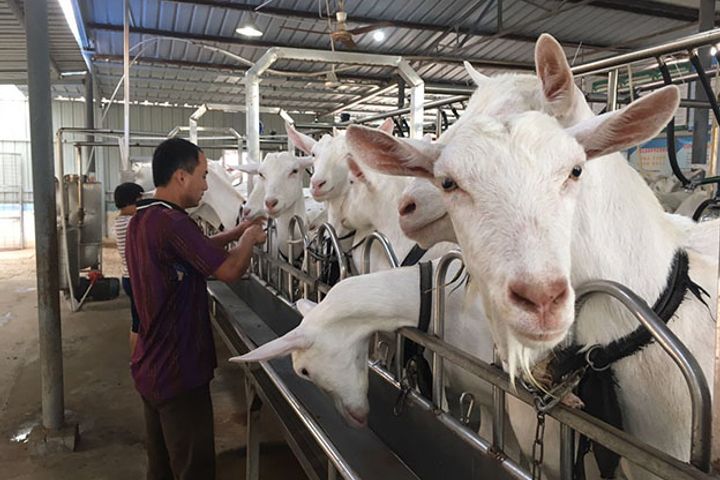 Goat Whey Powder Mania Drives Steep Price Rises, Drains Supplies
Goat Whey Powder Mania Drives Steep Price Rises, Drains Supplies(Yicai Global) June 25 -- Chinese milk powder producers' craze for pure goat milk products has caused the price of sweet goat whey powder to soar recently, thus hampering Chinese enterprises' and the sector's growth.
Many Chinese dairy enterprises have been actively developing pure goat milk powder products, thus pushing sweet goat whey powder -- which is mainly imported -- into short supply, with prices going through the roof. Though some producers have tried to make this ingredient themselves, it is too early to tell whether this will suffice to balance market supply long term.
Goat whey powder is mostly used in the production of milk powder for babies, one of the key segments in the sector. However, the whey derives from goat cheese, which few companies in China can make, so most of the country's whey is imported from Italy and the Netherlands. As global demand for goat cheese is not particularly high, few companies even export the product.
As competition sharpens, ever more Chinese dairy enterprises are steering for the goat milk powder market to showcase their unique competitiveness. The generally label their products 'pure goat milk powder' to highlight quality.
This trend is turning the powder into a hot commodity, with prices of imports over CNY80,000 (USD12,250) per ton and a shortage in spot supplies, Yicai Global has learned.
"As of now, the market price of sweet goat whey powder is fivefold that of cow whey powder," said Wang Baoyin, the board chairman of Shaanxi Hongxing Meiling Dairy. Some deals have closed as high as CNY200,000 per ton.
Such a price is uncommon, Wu Shaohong, executive director of Hong Kong's Ausnutria Dairy, told Yicai Global. The short supply has pushed desalted goat whey powder prices significantly higher than last year.
Udderly Inadequate
The rise is mainly attributed to the greatly insufficient supply, while the ranks of those hopefuls inclined to embark on the business have suddenly swelled, Wang Weimin, the secretary-general of the Shaanxi Safe Dairy Production Association, told Yicai Global.
Only several countries produce this raw material, and only then in small amounts. Facing the unexpectedly growing demand, they will certainly hike prices, he said.
By the end of June, 251 infant formula goat milk powder products from 84 enterprises had been registered both home and abroad, with 33 enterprises committed to purity thus bound to use goat whey powder as an ingredient, per public statistics.
The sector is thus locked in a battle for resources, an insider with Guangdong province-based Yashily Group told Yicai Global. Its prompt action to safeguard its supply of goat whey powder has left the firm virtually unaffected in this round of soaring prices, however.
In contrast, Chinese goat milk powder brands with inadequate capital are having a hard time of it. As this ingredient is a vital constituent of 30-40 percent of formula milk powder, the soaring price exerts considerable cost pressure on small and medium firms.
Goat whey powder is a by-product of goat cheese. Since Chinese have no traditional custom of eating cheese, they do not produce goat whey powder, either, so imports mainly feed demand.
The production lines of Shaanxi Hongxing Meiling Dairy went into operation this month with an annual yield of 3,500 tons of goat cheese and 1,500 tons of desalted whey powder, said Wang Baoyin. The products are mainly for self-use, but some may also be sold to rival firms, which makes the company the first infant formula goat milk powder enterprise to self-produce goat whey powder in China.
No Whey
The decision to produce the powder seeks to ensure raw material security, Wang told Yicai Global, since heavy reliance on imports means any bottleneck will pinch Chinese producers' raw material supplies.
Whether made-in-China goat whey powder can balance the market supply remains to be seen, however, in the insiders' view.
Ten tons of goat milk yields only one ton of goat whey powder, an expert requesting anonymity told Yicai Global. Localizing production thus requires consumption of large amounts goat milk. Though it may develop the milk goat breeding industry, China must deal with the goat cheese produced as a by-product of whey powder. High prices and the lack of a cheese-eating custom thus cast shade on the prospects for these goat products in China, in his view.
Editor: Ben Armour